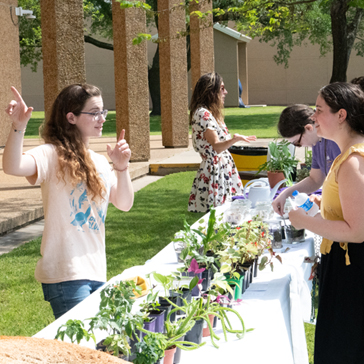SHREVEPORT – LSUS received a hunger-free campus designation from the Louisiana Board of Regents, signifying that the university has mechanisms in place to combat student hunger.
LSUS met the criteria for higher education institutions set forth in Act 719 of the 2022 Regular Legislative Session.
Operation of a charitable food pantry is one of the key criteria, and LSUS’s food pantry has been open since 2018.
In addition to the normal dry goods and other foodstuffs, the food pantry began receiving fresh vegetables and herbs from the community garden established by the Red River Garden Club, a student-led organization.
“We take great pride from having this designation and the opportunity to pursue future funding with this designation,” said Angel Martin, the director of student activities and recreational sports at LSUS. “People assume that because college students are able to pay tuition or their cell phone bill, they surely have plenty of money to pay for food.
“We encounter everything from students needing immediate access to food right before taking a test to students that are worried about getting through the week with the groceries in their pantry and the money in their bank accounts. There’s only so much room for students to worry about school if they are worried about a basic need like food.”
Other benchmarks include establishing a hunger-free taskforce involving students and staff, informing and connecting students to federal resources like the Supplemental Nutrition Assistance Program (SNAP) and holding at least one anti-hunger awareness event per year.
Martin said she’s convening the LSUS taskforce to plan a week of anti-hunger awareness events in November. LSUS also holds an annual Basic Needs Fair to connect students to existing resources.
“We wanted to look at the week of events in two ways – not only to tackle hunger but to give students an opportunity to see the volunteer side of things,” Martin said. “We’re looking to connect with local organizations and build on our great relationship with the Food Bank of Northwest Louisiana.
“Even though students may not be able to contribute financially to the food pantry for what they receive, they are often interested in contributing their time and give back in that way.”
Students can visit the Food Pantry, located on the second floor of the University Center, and receive items once per week, up to 75 pounds of food per month.
LSUS is one of 31 state public universities and four private universities that earned the hunger-free campus designation, which was created by legislation from Baton Rouge state representative Barbara Freiberg.
“As a former classroom teacher and campus administrator, I know firsthand the importance of nutrition to a student’s academic success,” Freiberg said in a statement. “Research shows hungry students have lower GPAs and struggle more to earn their degrees than students who know where their next meal is coming from. I was proud to sponsor this legislation and look forward to supporting legislative funding for the grant program next year.”
Earning this campus designation means that LSUS can compete for grants, which could be used in areas like the community garden, refrigeration in the food pantry and providing basic kitchen equipment.
LSUS is actively connecting students to resources other than just food.
LSUS is aiding students via the SHARE Center, which addresses areas in student health, advocacy, resources and empowerment.
The center, which will have a grand opening later this fall but is already informally helping students, is designed to raise awareness about resources that can remove structural barriers.
“The SHARE Center is our initiative to enhance student health, belonging and well-being so students can focus on academics, career goals and interpersonal relationships,” said Dr. Paula Atkins, Dean of Students at LSUS. “We will work with students to identify their gap in needs and services such as transportation, childcare, housing and healthcare and then connect students with those resources.
“Thanks to our wonderful LSUS Foundation, we were able to purchase Single Stop, an electronic platform used to confidentially screen students for federal and state benefits. Single Stop also provides direct connection to community resources through an interactive map and application to services. This can be accessed in person or online.”
The SHARE Center is located on the second floor of the administration building, room 218.


